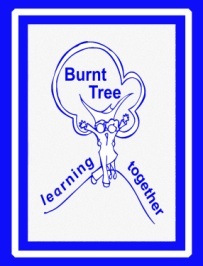Religious Education
Purpose of Study
Religious education contributes dynamically to children and young people’s education in schools by provoking challenging questions about meaning and purpose in life, beliefs about God, ultimate reality, issues of right and wrong and what it means to be human. In RE pupils learn about religions and beliefs in local, national and global contexts, to discover, explore and consider different answers to these questions. They learn to weigh up the value of wisdom from different sources, to develop and express their insights in response, and to agree or disagree respectfully. RE teaching therefore should equip pupils with systematic knowledge and understanding of a range of religions and beliefs, enabling them to develop their ideas, values and identities.
School Vision
At Burnt Tree, we aim for our children to gain an understanding of their own beliefs and values and those of others, to explore and weigh up the different communities of faith and belief in our school and to think deeply about life’s biggest questions and issues. Through a broad and balanced curriculum, we promote equality and respect, and hope that the children that we teach become contributing members of society.
We teach our pupils to:
- Explore their own beliefs (whether they are religious or non-religious), in light of what they learn, as they examine issues of religious belief and faith and how these impact on them personally, and to express their responses;
- Build their sense of identity and belonging, which helps them flourish within their communities and as citizens in a diverse society;
- Develop respect for others, including people with different faiths and beliefs, thereby helping to challenge prejudice;
- Consider their responsibilities to themselves and to others, and to explore how they might contribute to their communities and to wider society. It encourages empathy, generosity and compassion.
- Question the meaning and purpose of life, beliefs, issues of right and wrong and what it means to be human.
- Become familiar with the British Values and consider these in line with religion and the community. Pupils will be encouraged to be tolerant and respectful of other religions.
To help us achieve this we:
-
Study a range of religious groups in the UK and make space for the world views of the local community.
- Teach inclusively, ensuring that our RE is inclusive of both religious and non-religious world views.
- Provide a broad and balanced curriculum which promotes their spiritual, moral, social and cultural (SMSC) development.
- Teach depth, rather than breadth. Depth is more important than overstretched breadth and so, no more than 4 religions are studied in one year.
- Ensure that RE is at least 5% of the curriculum, equalling 36 - 45 hours over the school year, depending on the year group.
- Ensure coherence and progression by timetabling weekly RE lessons for all year groups.
